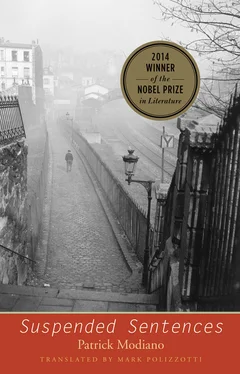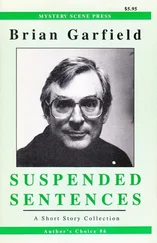They left, wishing me good luck. A few moments later, I discovered on the bridge table four five hundred — franc bills, neatly folded. I tried to find the address of his office on Faubourg Saint-Honoré. In vain. And I never again saw the Tall Man with the Jaguar.
On Thursdays and Saturdays when Snow White wasn’t there, Annie would take my brother and me to Paris in her 4CV. She always followed the same route and, with some effort of memory, I was able to reconstruct it. We took the western highway and drove through the Saint-Cloud tunnel. We crossed a bridge over the Seine, then went along the river through Boulogne and Neuilly. I remember large houses near the banks, protected by fences and foliage. Also barges and floating houses that one reached via wooden stairs: at the foot of those stairs were mailboxes, each with a name on it.
“I’m going to buy a barge here and we’ll all live on it,” said Annie.
We arrived at the Porte Maillot. I was able to locate that stop in our itinerary because of the little train in the Jardin d’Acclimatation. Annie had taken us on it one afternoon. And we reached the endpoint of our journey, in that zone where Neuilly, Levallois, and Paris all blended together.
It was a street lined with trees, their leaves forming a vault. No dwellings, only warehouses and garages. We stopped in front of the largest and newest garage, with a tan pedimented façade.
Inside, a room was blocked off by glass-paneled walls. A man was waiting for us, with curly blond hair, sitting on a leather chair at a metal desk. He was Annie’s age. They spoke familiarly. He was dressed, like Jean D., in a plaid shirt, a suede windbreaker, a Canadienne in winter, and crepe-soled shoes. Privately, my brother and I used to call him “Buck Danny,” because I thought he looked like a character in an illustrated children’s book I was reading at the time.
What could Annie and Buck Danny have had to talk about? What could they have been up to when the office door was locked from the inside and an orange canvas shade came down over the windows? My brother and I would wander around the garage, which was even more mysterious than the great hall of the chateau abandoned by Eliot Salter, the marquis de Caussade. One by one we pondered the cars that were missing a fender, a hood, a rubber tire on a wheel. A man in overalls was lying under a convertible and repairing something with a monkey wrench; another, hose in hand, was filling the gas tank of a truck that had come to a halt with a terrible snorting of its engine. One day, we recognized Roger Vincent’s American car, its hood open, and we concluded that Buck Danny and Roger Vincent were friends.
Sometimes we’d go to meet Buck Danny at his home, in an apartment building on the boulevard, which I now think was Boulevard Berthier. We’d wait for Annie on the sidewalk. She came out with Buck Danny. We’d leave the 4CV parked in front of the building and walk, the four of us, to the garage, down narrow streets lined with trees and warehouses.
It was cool in the garage, and the smell of gasoline was stronger than the smell of cut grass or water when we sat by the mill wheel. The same kind of shadow floated over certain corners, where neglected cars slumbered. Their bodies shone dimly in that half-light, and I couldn’t stop looking at a metal plaque affixed to the wall, a yellow plaque on which I read a seven-letter name in black letters, the design and sound of which still move me even today: CASTROL.
One Thursday she took me alone in her 4CV. My brother had gone shopping with Little Hélène in Versailles. We parked in front of the apartment building where Buck Danny lived. But this time, she came back out without him.
At the garage, he wasn’t in his office. We got back into the 4CV and drove through the narrow streets of the quarter. We lost our way. We turned round and round in those streets that all looked alike, with their trees and their warehouses.
She finally stopped in front of a brick building, which I now suspect might have been the old Neuilly tollhouse. But what’s the use of trying to find the place? She turned around and stretched her arm toward the back seat, reaching for a Paris map and another object that she showed me and whose purpose I didn’t know: a brown crocodile-skin cigarette case.
“Here, Patoche, this is for you … It’ll come in handy later on.”
I contemplated the crocodile-skin case. It had a metal lining inside and contained two sweet-smelling cigarettes made of blond tobacco. I took them out of the case and, as I was about to thank her for the present and hand her back the two cigarettes, I saw her face, in profile. She was staring straight in front of her. A tear was falling down her cheek. I didn’t dare make a sound, and Frede’s nephew’s statement echoed in my head: “Annie cried all night long at Carroll’s.”
I fondled the cigarette case. I waited. She turned toward me and smiled.
“Do you like it?”
And, with an abrupt movement, she started up. She always made abrupt movements. She always wore men’s jackets and pants. Except at night. Her blond hair was very short. But there was such feminine softness about her, and such frailty … On the road back, I thought about her serious expression, when she sat with Jean D. in the 4CV under the rain.
I returned to that neighborhood, about twenty years ago, more or less around the time when I’d seen Jean D. again. For the month of July and the month of August, I lived in a tiny room beneath the eaves in Square de Graisivaudan. The sink touched the bed. The foot of the latter was just a few inches from the door and, to enter the room, you had to let yourself topple onto it. I was trying to finish my first book. I walked around the fringes of the sixteenth arrondissement, Neuilly, and Levallois, where Annie used to bring my brother and me on our days off from school. That whole ill-defined zone, which might or might not have still been Paris, and all those streets were wiped off the map when they built the périphérique , taking with them all their garages and their secrets.
I didn’t think once about Annie when I lived in that neighborhood that we’d driven through together so often. A more distant past haunted me, because of my father.
He had been arrested one February evening in a restaurant on Rue de Marignan. He didn’t have his identity papers on him. The police were conducting checks because of a new German regulation prohibiting Jews from being in public places after 8 P.M. He had taken advantage of the twilight and a momentary distraction on the detectives’ part at the Black Maria to make his escape.
The following year, they had apprehended him at home. They had taken him to a holding cell, then to an annex of the Drancy transit camp, in Paris, on the Quai de la Gare — a vast merchandise depot where all the Jewish belongings the Germans had looted were being stored: furniture, dishware, linens, toys, carpets, and artworks, arranged by level and section as if in a huge department store. The prisoners emptied the cases as they arrived and filled other cases heading for Germany.
One night, someone showed up in an automobile at the Quai de la Gare and had my father released. I imagined — rightly or wrongly — that it was a certain Louis Pagnon, whom they called “Eddy” and who was shot after the Liberation with members of the Rue Lauriston gang, to which he belonged.
Yes, someone got my father out of the “hole,” to use the expression he’d employed one evening when I was fifteen, when I was alone with him and he’d strayed very close to confiding a few things. I felt, that evening, that he would have liked to hand me down his experience of the murky and painful episodes in his life, but that he couldn’t find the words. Was it Pagnon or someone else? I needed answers to my questions. What possible connection could there have been between that man and my father? A chance encounter before the war? In the period when I lived in Square de Graisivaudan, I tried to elucidate the mystery by attempting to track down Pagnon. I had gotten authorization to consult the old archives. He was born in Paris, in the tenth arrondissement, between République and the Canal Saint-Martin. My father had also spent his childhood in the tenth arrondissement, but a bit farther over, near the Cité d’Hauteville. Had they met in school? In 1932, Pagnon had received a light sentence from the court of Mont-de-Marsan for “operating a gambling parlor.” Between 1937 and 1939, he had worked in a garage in the seventeenth arrondissement. He had known a certain Henri, a sales representative for Simca automobiles, who lived near the Porte des Lilas, and someone named Edmond Delehaye, a foreman at the Savary auto repair in Aubervilliers. The three men got together often; all three worked with cars. The war came, and the Occupation. Henri started a black market operation. Edmond Delehaye acted as his secretary, and Pagnon as driver. They set up shop in a private hotel on Rue Lauriston, near Place de l’Etoile, with a few other unsavory individuals. Those hoods — to use my father’s expression — slowly got sucked into the system: from black marketeering, they’d moved into doing the police’s dirty work for the Germans.
Читать дальше












